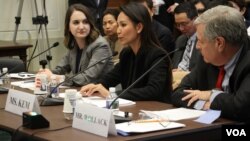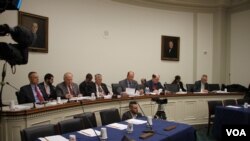U.S. congressmen on Tuesday held a hearing to assess new ways to apply sanctions on the government of Prime Minister Hun Sen over its crackdown on the opposition, media and civil society.
In the hearing, led by Ted Yoho, a Republican representing Florida, new measures including targeting officials, corporations, freezing assets and placing prohibitions on garment imports were discussed.
Three witnesses appeared at the hearing: Kem Monovithya, the daughter of the opposition Cambodia National Rescue Party’s jailed president, Kem Sokha; Olivia Enos, a policy analyst at the Asian Studies Center of the Heritage Foundation; and Kenneth Wollack, president of the National Democratic Institute (NDI).
The witnesses testified on a wide range of issues, seeking intervention from the U.S. government to pressure Phnom Penh to reverse its crackdown.
Dana Rohrabacher, a Republican representing California, asked the witnesses for a list of specific corporations, individuals, and their bank accounts that could be targeted by sanctions.
Congressman Brad Sherman (D-Cal), said it was time that Washington approached U.S. businesses and the European Union and Japan.
“If we decide to forego the special access to US market that any company buying garments from Cambodia can immediately void this contract, and so we can put that in the matter of law.”
Yoho said: “Hun Sen, the sitting Prime Minister, has been in power for more than 30 years, and has no intentions of relinquishing power. In the face of strengthening support for the opposition, it seems Hun Sen has decided that if he can no longer dominate the polls even in a rigged election system, he will retain power through force.”
Hun Sen has accused the United States of plotting with the now banned CNRP to overthrow him but has not provided evidence to support their claim, which Washington has denied.
On Thursday, the U.S. announced it was cutting some $1.8 million in aid to the country’s National Election Committee (NEC), a move Hun Sen claimed was intended to “kill off democracy” in Cambodia.
Wollack of the NDI told the hearing that supporting the NEC would not be appropriate, but that some support for election observation could still be justified.
“There are groups that are monitoring the process, reporting on the process I think support for those activities are important because it doesn’t necessarily legitimize the process but it helps groups share information about the process not only to the Cambodian people, but the international community as well,” he said.
“Even authoritarian leaders somehow want to go through an election process because they believe some legitimacy would be inferred upon the victor otherwise why have elections at all and just rule by decree,” he added.
Monovithya, Sokha’s daughter, suggested the United States continue its support for election observation
“So I wish to leave this opportunity to the Cambodian people to consider how to let the international community know about their will and what the Cambodian people want. Because the world now is yearning to know from the Cambodian people.”








